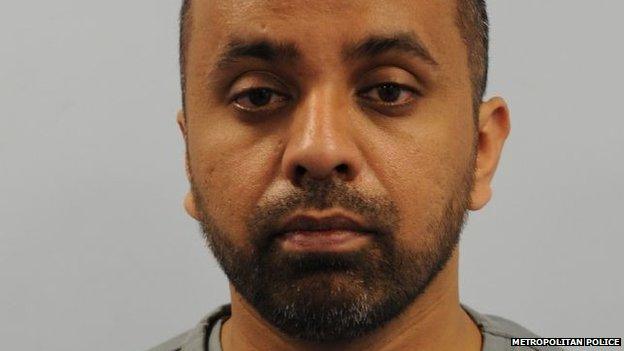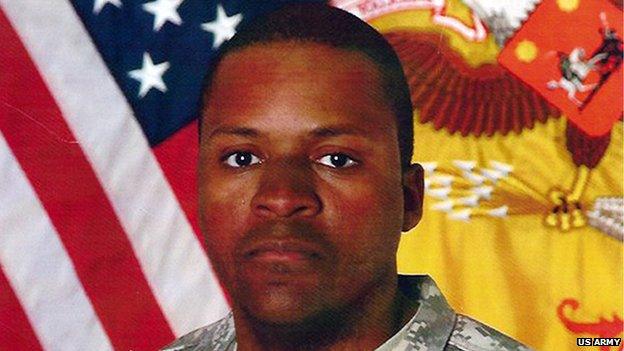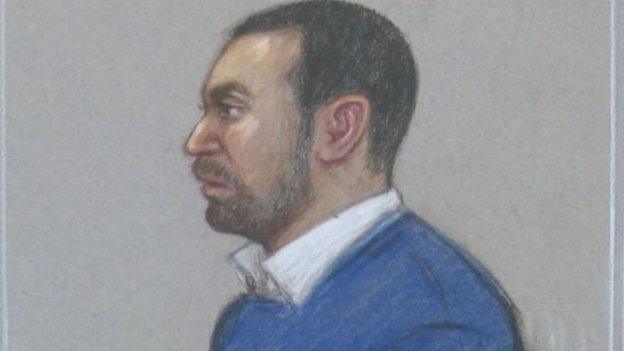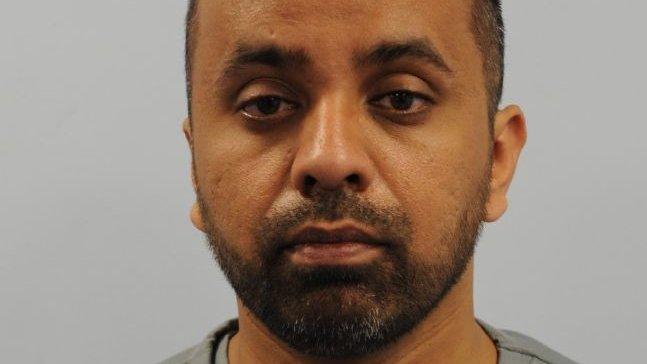Iraq bomber trial: Why Anis Sardar was convicted in UK
- Published

Anis Sardar's conviction has been hailed as a "landmark prosecution"
How can a man who helped make bombs in a foreign war end up on trial in a British court?
Anis Sardar, a 38-year-old black cab driver from Wembley, London, has been convicted of his role in making an improvised explosive device that blew up a US Army patrol, near Baghdad, in 2007.
The blast killed Sgt Randy Johnson of the US 2nd Cavalry Regiment.
This unique prosecution relied on painstaking forensic science and circumstantial evidence.
Those investigations placed the Londoner inside the team of bombmakers in western Baghdad and ultimately led to his conviction eight years after Sgt Johnson's death.
Extra-territorial crimes
But given Sgt Johnson was killed amid the chaos of Iraq, how could Sardar be found guilty of murder under English law?
As far as British detectives and the Crown Prosecution Service were concerned, this was an act of terrorism, rather than an act of war.
In legal terms, he was a British citizen who had committed a crime overseas.
Generally speaking, the criminal law of the land is just that - it applies only to offences in the UK.
But murder is one of a small number of the most serious crimes that are extra-territorial.
Any British citizen can be convicted of any murder abroad thanks to the 1861 Offences Against the Person Act, external. The nationality of the victim is irrelevant.
Parliament's rationale was that it wanted a law that would prevent British citizens from getting away with offences by orchestrating crimes abroad, particularly in circumstances where the local authorities would be incapable of bringing the culprit to justice.
So the question was not whether the law said he could be prosecuted, but whether he had a defence to the allegation.
'Repelling attacks'
The trial judge Mr Justice Globe told the jury that if they were sure Sardar had helped construct the device that killed Sgt Johnson, they also had to be sure his decision amounted to an action that he could not excuse away.
By his own admission, Sardar had helped build homemade bombs in west Baghdad in 2007, but he told the court he did not know whether he had handled the specific device that killed the American soldier.
The devices, he told the jury, had been constructed by members of a local Sunni community who were repelling sectarian attacks by Shia militias - one of the features of the chaos that followed the fall of Saddam Hussein.
Sardar argued he had wanted to help that local protection force stop the killing sprees, but he had not envisaged the devices would kill American soldiers.

Sgt Randy Johnson was killed eight years ago
In other words, Sardar argued that he was innocent of murder because he genuinely believed he had been acting to defend others - and the degree of violence was necessary and proportionate to the circumstances. This is the essence of the law of self-defence.
But the prosecution said that defence was irrelevant because the bombmakers' genuine target was the US Army and the defendant had known that.
The design, explosive power and location of each device could only mean they were aimed at destroying heavily armoured American patrols, prosecutors said.
But what about the circumstances of the death - could Sardar argue that Sgt Johnson was a casualty of a legitimate act of war?
The Geneva Conventions set out the rules and, as any soldier knows, military personnel can't be prosecuted for killing each other on the battlefield - assuming of course they do not commit a war crime.
'Vortex of violence'
That legal protection extends to people who come from abroad to the aid of an oppressed people.
For instance, British Muslims who fought in Bosnia 20 years ago to prevent the genocide of their co-religionists have never faced prosecution.
Sardar's counsel, Henry Blaxland QC, asked the jury to consider the chaos that Sardar had found himself in after he went to Iraq from Syria, where he had been living.
"How are we, here in Woolwich Crown Court in east London, expected to pass judgement on the reasonableness of someone's conduct in armed conflict in a different country?" he said.
"History shows that when law and order breaks down, previously stable countries can descend into a vortex of violence."
It's that violence that the jury decided Sardar unlawfully contributed to by building a bomb that took the life of Sgt Randy Johnson.
- Published22 May 2015

- Published21 May 2015

- Published21 May 2015
